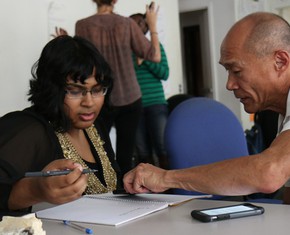The views expressed in our content reflect individual perspectives and do not represent the authoritative views of the Baha'i Faith.
The world’s equilibrium hath been upset through the vibrating influence of this most great, this new World Order. Mankind’s ordered life hath been revolutionized through the agency of this unique, this wondrous System—the like of which mortal eyes have never witnessed. – Baha’u’llah, The Most Holy Book, p. 85.
In the final installment of this three-part series of essays, we look at two more unique new teachings of the Baha’i Faith: a universal auxiliary language and the long-promised divine polity.
According to the Torah:
…The whole earth was of one language, and of one speech. – Genesis 11:1.
The people at that time attempted to build a tower by which they planned to reach heaven. For reasons unknown to us, the Bible records in Genesis 11:7:
…Let us go down, and there confound their language, that they may not understand one another’s speech.
And this, we are told, is how we came to have so many languages.
As of 2009, experts estimated that “6,909 distinct languages” existed in the world. It takes little imagination to appreciate the expense and confusion wrought by so many languages. Every translation is perforce an interpretation. We see this played out in Biblical translations alone; Wikipedia notes that “the full Bible has been translated into 531 languages, and 2,883 languages have at least some portion of the Bible.”
Baha’u’llah, the prophet and founder of the Baha’i Faith wrote, in his Most Holy Book:
O …Members of parliaments throughout the world! Select ye a single language for the use of all on earth, and adopt ye likewise a common script. – p. 88.
At the United Nations, the representatives of 193 member states must receive highly accurate translations of all documents and speeches given at the sessions. There can be grave consequences for translations that are not grammatically and linguistically accurate. A single language would go far to remove errors and misunderstandings, not just at the UN but all over the world.
Perhaps the most profound of Baha’u’llah’s new teachings is that of a divine polity. All over the world, we see the failure of man-made instruments of human organization. The Baha’i writings proclaim:
The chief idols in the desecrated temple of mankind are none other than the triple gods of Nationalism, Racialism and Communism, at whose altars governments and peoples, whether democratic or totalitarian, at peace or at war, of the East or of the West, Christian or Islamic, are, in various forms and in different degrees, now worshiping. – Shoghi Effendi, The Promised Day is Come, p. 113.
Humanity was promised a divine polity as far back as the Old Testament—every Christmas season we rehearse the Bible reading of that promise:
For unto us a child is born, unto us a son is given: and the government shall be upon his shoulder: and his name shall be called Wonderful, Counsellor, The mighty God, The everlasting Father, The Prince of Peace.
Of the increase of his government and peace there shall be no end, upon the throne of David, and upon his kingdom, to order it, and to establish it with judgment and with justice from henceforth even for ever. The zeal of the LORD of hosts will perform this. – Isaiah 9:67.
 As Christ appeared in the role of the Son, Baha’u’llah came with the title of the “Father.” Indeed, Christ was asked point-blank if he were the “Prince of Peace.” He responded: “Think not that I am come to send peace on earth: I came not to send peace, but a sword.” – Mathew 10:34.
As Christ appeared in the role of the Son, Baha’u’llah came with the title of the “Father.” Indeed, Christ was asked point-blank if he were the “Prince of Peace.” He responded: “Think not that I am come to send peace on earth: I came not to send peace, but a sword.” – Mathew 10:34.
In reference to earthly government, Christ rejected any role saying “My kingdom is not of this world” – John 18:36.
And yet Christ prayed in Luke 11:2: “Thy kingdom come. Thy will be done, as in heaven, so in earth.”
Christ would never ask us to pray for that which will never appear. Indeed Christ advised Christians not to ask in his name, but in the name of the Father: “At that day ye shall ask in my name: and I say not unto you, that I will pray the Father for you.” – John 16:26.
And so Baha’u’llah, “The Glory of God,” has come with a new name, as promised in the Book of Revelation. Today this divine government is in place locally, nationally and internationally, and yet there is no interference with secular governments because Baha’is do not engage in partisan politics. Only believers in Baha’u’llah and his Faith participate in this divine administrative order—the world’s first truly global system of democratic governance.
Once Baha’u’llah’s revelation has conquered the citadels of the human heart will the promise of a “new heaven” and a “new earth” be realized.
Do we truly believe that God “shall judge among the nations, and shall rebuke many people: and they shall beat their swords into plowshares, and their spears into pruninghooks: nation shall not lift up sword against nation, neither shall they learn war any more”? – Isaiah 2:4; Micah 4:3.
Baha’u’llah declared, “Soon will the present day order be rolled up and a new one spread out in its stead.”
You May Also Like
Comments

















Barely skimming this, most Bahais use this to justify inaction. But:
1. It calls for action. It encourages Bahais to learn Esperanto, and
2. It clarifies the intent of Abdu'l-Baha in commanding Bahais to learn it; Esperanto is, by this very Quote, designated as the Bahai culture's "native" language. (If you're having trouble accepting that, I encourage you to read the Quote again more ...closely. Don't take my word for it. Go read it for yourself.)
3. The injunction to only learn Esperanto for the purposes of making it our cultural language has a very specific time limit. That particular Stage ONLY. In Bahai terms, a Stage is from one major Plan/event to the next. A great many Stages have passed.
4. Yet, the Command for Baha'is to adopt Esperanto and ensure it is taught in every public (and by extension, Baha'i) school remains valid in perpetuity, because the Command came from higher up the Authority chain. Shoghi Effendi did not have Authority to countermand it, nor does the Universal House of Justice. Nor have They done so!
5. Yet, the Universal House of Justice has not pushed the issue forward. One might say "the time is not yet right." I say, "the Baha'i community is not yet equipped to succeed with it." Individual Baha'is, however, very much are. Thus, the command applies to individual Baha'is right now, today. The communal initiative, on the other hand, must wait on enough individual Baha'is to awaken to their duty and achieve it so that the communal initiative can succeed.
There are two separate Commands in the Writings that are communal in nature regarding the establishment of a universal auxiliary language. One is directed to the nations of the world. The other is directed to the Universal House of Justice. They differ in scope, quite obviously, and are equally obviously separate Commands. I do not consider it a coincidence or a mistake. One might think the former must precede the latter. That is incorrect thinking. Baha'is are the Lamp shining on the World. Light travels out from its source. In order for the World to receive the Light it so desperately needs, it must shine out from the Lamp. The Universal Language Pillar of our Faith is named as the Brightest Ray. There are a ton of meanings we can derive from that. What I get from it is, we as Baha'is must concretely act toward solving our own language issues (by enacting the Command of Abdu'l-Baha to adopt Esperanto) both individually, and when success is graspable, communally, before the World can even hope to grasp the Ray for itself and adopt a universal language (possibly not the same one!) I have no doubt that the Universal House of Justice will act when It deems the Baha'i community is ready to succeed with the adoption, because it is Commanded that the Universal House of Justice will do exactly that.
Everything else is posturing. We can talk about this Quote and that Quote, and we should. But the root of the situation, it's heart, is what I've described above. I have meditated on the subject for several years, as I'm sure most of us have. Am I the only one who believes this? I seriously doubt it. But the Truth of it is not easily seen. Few have studied the Writings on this subject deeply enough to grasp it, and I do not doubt that nearly every person currently alive who has is ssubscribed to this list!
Yet, language is so core to identity, demanding that someone learn one is almost an invasion. That is why it needs to be taught, as it was 100 years ago, in Baha'i schools everywhere. This Principle and our duty to act upon it transcends Five-Year-Plans. It transcends all other Baha'i initiatives, in the same way Firesides and Huququ'llah do; it is a Core Pillar of the Baha'i Faith. So do not shrink down when someone asks you how teaching Esperanto in Baha'i Sunday School fits in the Plan. The Plan conforms to the Law, not the other way around. I realize that thought will send some of your minds reeling, but if you step back and consider, it is obviously truth.
Maybe I have stepped over a boundary in presentation. If so, I apologize. (But that does not make it less true.)
For your consideration,
James